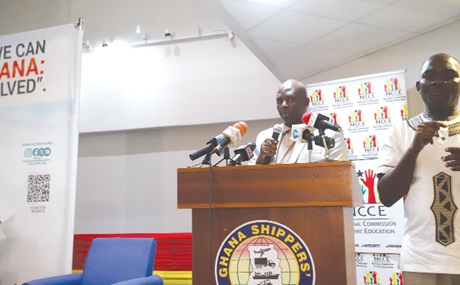
Work to resolve differences - Dr Osae-Kwapong urges NPP, NDC
The Director of the Democracy Project, Dr John Osae-Kwapong, has stressed the need for Parliament to find common ground and work collaboratively to resolve the current impasse in the House.
He said it was better to resolve their differences within rather than constantly relying on the Judiciary to settle disputes.
“We need to build consensus around the things that matter,” he stated.
Dr Osae-Kwapong was speaking in an interview with the Daily Graphic following the indefinite adjournment of Parliament last Tuesday by the Speaker of Parliament, Alban Sumana Kingsfold Bagbin.
He stated that while the Speaker's decision to adjourn Parliament was technically legal, it was crucial to consider the broader implications.
“How do we move forward on these issues? So the rules of Parliament does allow the Speaker to have Parliament go on recess,” he said.
” So what the Speaker has done is not illegal, right? But sometimes as a matter of good governance, you also cannot think strictly in terms of the rules and the laws. Sometimes, you also have to think about the appropriateness of the practice, the precedents that you set, the conventions, the informal rules that we all agree to play by,” he stated.
Constitutional crisis
Dr Osae-Kwapong noted that the standoff between Parliament and the Judiciary after the Supreme Court stayed the Speaker’s decision which declared the seats of four Members of Parliament vacant last Thursday might also sparked a potential constitutional crisis.
“Some are seeing this as some kind of a constitutional crisis, Parliament against the Judiciary, Chief Justice against the Speaker,” the governance expert said, saying that constitutional crisis was not a bad thing. They can be an excellent learning and teachable moment.
“So for me, the question now is from this current crisis, what do we learn from it? What does the Judiciary learn from it in terms of how it dispenses politically sensitive cases that come before it?
How does Parliament treat the Supreme Court as a co-equal branch but also recognise that it is the branch that has the final say on the Constitution?,” he asked.
“Otherwise, it would become a missed opportunity for us to rethink some of these institutions, the design, the rules and the practices. If we don't take time, the lesson we may learn from it deepens how we feel about my side is right, your side is right, your side is wrong and things like that,” he said.
“But we can emerge from it stronger if we learn the right lessons or if we learn some positive lessons from this,” he added.
Resolution
To resolve the crisis, Dr Osae-Kwapong recommended a meeting among the three arms of government- the Executive, Parliament and the Judiciary.
“Yes, sometimes it takes leaders in such a moment to say, look, instead of escalating things, let's all sit down, let cool heads prevail. You don't lose your independence,” he said.
“For the sake of the country's democracy and governance architecture, these differences that are emerging, how do we resolve them so that Parliament can continue doing its work without anybody having to call on the Judiciary to decide how it does your work” he said.
Partisanship
“Rising partisanship is exacerbating the crisis, with even seemingly neutral issues quickly becoming politicised. Think about any issue and five minutes into the conversation, it becomes an NPP and NDC matter," Dr Osae-Kwapong observed.
"Even if you look at the Afrobarometer report, when I do my analysis and you break down a lot of the questions by party affiliation, trust in institutions is one example. When my party is in power, I trust institutions more than when my party is in opposition," he said.
By embracing this learning opportunity, Dr Osae-Kwapong said the country could emerge stronger, but if ignored, the crisis might reinforce the partisan divisions, undermining the nation’s democratic progress.
